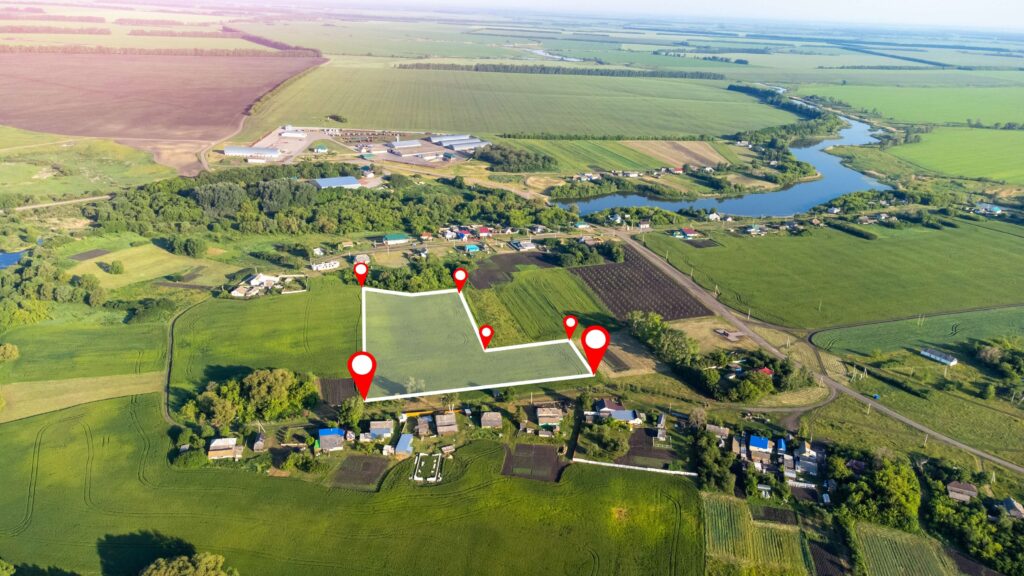A complete guide to the steps forward and capital gains tax implications
Inheriting farmland from an estate after losing a loved one is a major responsibility after an already difficult time for a family. After helping hundreds of families through this process, I thought it would be helpful to share the process and things to consider from start to finish as a step-by-step guide if you inherit farmland or a parcel of rural land.
| Inherited Farmland from an Estate? Click to download our PDF Guide Book on what to do if you inherited farmland from an estate |
Ownership Structure of the Real Estate
After a loved one has passed and farmland has been passed down to the heirs of the estate, it is vital to start with the facts. First, look at the ownership structure of the real estate. Is it titled in a personal name of the deceased, an LLC, LLP, Trust, ETAL, or a business name?
Next, identify the decision makers within the entity and determine who is involved in this process or responsible for signing documents. For example, if the land is held in a trust, there may be one or many individuals named as trustees. If there is an estate, the executor is often named as the responsible party, even though there may be many heirs or beneficiaries.
Locate Important Documents
Locate essential documents for the real estate. Often, a farm file is kept in a safe, desk, safety deposit box, or another location where important documents are stored. Each farm or parcel of farmland may have a name, parcel number, or PID, USDA Department of Agriculture documents (156-EZ, wetland determination, tile maps, irrigation or well information, fertilizer or yield history, organic certification, CRP or CREP contract, farmland lease, hunting land lease, solar or wind Lease to name a few)
If the property is located in a state where an abstract shows history or chain of title, you may also see an abstract for each parcel or tract of land. This document is crucial for tracking the property’s title history. It should be stored in a secure location for future reference, in case the property is sold, split, or the title chain requires modification or review.
Here is a video showing what an abstract looks like if you are having trouble.

Talk to Other Heirs of the Estate
This farmland has more than likely been owned by a family for a very long time, sometimes 50, 100, 150, or even 200 years! The struggles, gains, losses, floods, droughts, and memories on this land are what family legacies evolve around.
The crops of corn, soybeans, wheat, cotton, rice, sorghum, alfalfa, and many more were grown here and sent all over the world to feed families, fuel vehicles through ethanol, make clothing or feed chickens cows, pigs, turkeys to name a few of the thousands of uses for the crops that were sewn and harvested on this land. The stories of the farm are stories that will live on and should be celebrated among families, heirs, partners, and children.
Talking to family members about the future of the farmland real estate is very important, as is hearing everyone’s point of view that is involved. Families often become business partners for the first time, sometimes with siblings’ children or extended family, and discover an asset worth hundreds of thousands or millions of dollars for the first time in their lives. Starting a conversation about what everyone is thinking, timelines, options, and goals are all important to discuss at this point.
Current Land Market Conditions
The farmland market is similar to other markets, such as the stock market, residential housing market, commercial real estate market, or used equipment market. This market fluctuates in value based on the supply and demand of what buyers are willing to pay. Farmland prices fluctuate at different times for several reasons. The top ten things that affect farmland prices.
- Interest Rates
- Commodity Markets
- Supply and Demand
- Politics, Laws, and Trade
- Weather
- Property Taxes
- Government programs
- Expanding or contracting cities for development
- Water Rights and Water Availability
- Grain Markets
| What is my land worth? Click to discover the value of your land |
Options for Inherited Farmland
Option 1: Keeping the Inherited Farm
Hanging onto the farm for a period has some positives and negatives. Maintaining a family farm over time is best achieved with a clear end goal in mind. When a farm is inherited, there is a significant tax advantage to the beneficiaries called a “step up in basis”.
When the original purchaser purchases a farm, a basis is established at that purchase price. In many cases in Iowa, farmland, for example, was purchased anywhere from $50 to $5000 per acre in the past.
Fast forward to today’s farmland values, and that farm may be worth $10,000 to $25,000+ per acre in value, so a major appreciation has potentially occurred, which would be taxed as capital gains. However, upon the owner’s death, when the asset is passed onto heirs, the inherited cost basis is adjusted or steps up to fair market value based on the date the owner passed away. This potentially offers a substantial savings of capital gains on inherited farmland when sold by the beneficiaries.
Option 2: Renting the Inherited Farm
When the farmland is inherited from an estate, over 85% of the time in our experience, there is currently a tenant in place that is renting the farm. This operator is responsible for planting the crop, performing maintenance, harvesting the crop, and selling the harvest or using it to feed livestock, which is then sold.
In exchange for this, the operator is paying rent to the landlord or property owner. This rent is usually paid in one of 4 ways. Cash rent paid up front, cash rent paid in 2 payments annually, shares based on crops sold, or custom farmed on behalf of the landlord. For more information on the different types of rent.
The Secret to Investing in Farmland – How to Find a Tenant

This rental contract may be year by year or multiple years. It may be subject to tenant rights to continue to farm the property in the future under the current terms if not appropriately canceled by the deadline and/or renegotiated by state law or contract terms. States like Iowa have a specific date by which this contract must be terminated, and states like Minnesota, Missouri, Wisconsin, South Dakota, North Dakota, Kansas, and Nebraska all have different state laws around farm tenancy termination requirements.
Suppose the lease is cancelled via the correct legal method. In that case, it allows the landlord to do as they please with their real estate after the successful termination and/or the completion of the contract in full.
This could involve renting it out to the same tenant at a new, current fair market price or to a new operator under different terms. This is where the value of a Professional Farm Manager can be a value for a family or owner of farmland. Read the full article on whether hiring a professional farm manager is a smart move or not here.
A professional farm manager at High Point Land Company is a licensed real estate agent who has extensive experience in managing and selling farmland. This farm managers job is to optimize the investment for the landlord, communicate and negotiate rents with the tenant, keep tabs on the market to ensure a fair rental price, execute a competent lease, monitor property maintenance, fertility and chemical applications, USDA programs, crop yields and regular property visits all reporting back to the landlord with the results.
Often, the land has a lease that has not been updated or brought up to fair market value for a long time. This is where a professional farm manager steps in as a third party to ensure the landlord’s investment is a positive experience. Much like a stock portfolio, 401 (k), or commercial rental property, a farm is an asset that, when placed under professional farm management, should minimize any stress of ownership and maximize the investment that a family has made for generations of the past and future.
The cost of hiring a professional farm manager typically ranges from 5% to 10% of the annual income, depending on factors such as the farm’s size, whether it has permanent or annual crops, and the type of lease. Having the right manager on your side should increase net yearly income above the expenses they charge, reduce the stress of owning the asset, and increase the value of the land for future rental or sale when done right.
Farm managers also add value to the farmland owner by connecting them with trusted, experienced professionals such as an estate or real estate attorney, water rights specialist, lender, surveyor, appraiser, real estate agent, auctioneer, excavator, drone operator, accountant, insurance agent, tiling company, qualified Intermediary (QI) or title company to name a few. These professionals can assist with mediation, partnerships, 1031 exchanges, estate settlement, probate, loans, refinancing, certified general appraisals, taxes, fertility, maps, and many other services that can help a farmland owner make informed decisions at a fair price.
Option 3: Selling the Inherited Farmland

If selling the land is a decision that has been reached or is being considered, there are very important steps that can make the process much more enjoyable, profitable, and efficient.
The challenge many people who own or inherit farmland from an estate do not realize is that to sell farmland, a licensed real estate agent may not have to have any experience in such a transaction to obtain or maintain a license. Every state has a real estate licensing process, and that real estate license may not require the agent to have experience in selling farmland, which can result in disaster for a family looking to sell farmland without an experienced farmland broker.
The farmland real estate space is a niche within the real estate profession that requires a much different set of programs, tools, equipment, and skillset than other areas of the real estate business.
Real estate agents specialize in different areas. These include residential, commercial, leasing, auction, and property management. This helps them provide the best experience for their clients.
One red flag to notice is an agent who deals with many types of real estate. They may not be a specialist in selling farmland.
Here are some tips to consider when looking to hire a real estate agent or auctioneer to sell your farmland. Here is a short video that explains how to choose the best way to sell farmland. This farmland may come from an estate, trust, or inheritance.

20 questions to ask a real estate agent before hiring them to sell farmland.
- Experience: How long has the professional actively sold real estate?
- How long has the person been selling land specifically?
- How many farms has the agent or company sold, in what area, of what type, and of what quality? Who were the buyers?
- What type of sales methods does the company offer?
- Are they willing to do an opinion of the value of your land?
- Do they know the current market and all the land that is selling?
- Does the firm offer other services that benefit your sale?
- Has the firm completed 1031 exchanges, or does it have an investor pool to market to?
- What is the marketing budget for selling your land, and does an in-house or outside firm handle it?
- What does the firm offer as services from start to finish, and how involved are you going to have to be?
- What communication standards can you expect from the agent or company during the listing or contract period?
- Is the company too small, too big, or just right to get the best outcome for you? Will you be treated like a number, and will your property be marketed to a large enough buyer pool?
- How will your specific property stand out on a website?
- How will they conduct the showings?
- Is the company properly insured, licensed, experienced, and motivated?
- What are they going to charge to sell your land? Are there any other fees?
- What professionals can they recommend to maximize your sales’ profitability and address any questions that may arise?
- What experience do they have in owning land personally or selling real estate with a firm themselves from your point of view?
- Is this their full-time profession?
- Who would they expect to buy the land, and for what highest and best use?
| What is my farm worth? Click to discover the value of your land |
Other Professionals to Consider when Selling Farmland
Real Estate Attorney
An attorney can assist with various aspects of selling farmland, including estate and probate matters, legal documents, mediation between members, form approval, title opinion, settlement statement, and real estate closing. Attorneys, much like real estate professionals, have a niche they specialize in, from divorce, family law, criminal, corporate law, bankruptcy, real estate, and health, to name a few. Ensuring you have an attorney who understands farmland is crucial, as a skilled attorney with experience in this field can be highly beneficial.
Ag Lender or Banker
Whether buying or selling farmland, an agricultural loan officer at a bank that provides financing for vacant land can be a meaningful relationship. If a loan is currently recorded as a lien on the title of the real estate, it is essential to request specific information.
Land loans on farmland can be significantly different from conventional residential mortgages, making it crucial to understand the details when considering whether to keep the land or sell the farmland. Farmland loans are typically amortized over 10, 15, 20, or 25 years, meaning the loan balance is calculated using an amortization schedule based on this time frame to pay off the loan. The loan also has an interest rate that may be locked in for the term of the loan schedule or adjustable based on the loan terms.
The payment for the loan is often also different and scheduled to be paid by the borrower monthly, quarterly, biannually, or annually. There should be a loan officer or team assigned to the loan who can provide loan specifics to assist with payment planning or request a payoff amount. This is helpful when considering selling farmland to ensure you know what your net proceeds will be after the loan balance is paid off successfully.
Accountant
When considering selling farmland in the Midwest, a qualified accountant can be essential. Estate tax, capital gains tax, property tax, depreciation schedule, depreciation recapture, and inheritance tax on farmland are a few of the taxes that may be due and should be considered when selling farmland acquired from an estate. An accountant can assist in decisions and timing of a sale or a decision to keep a tract of farmland.
There are many tax advantages to owning real estate, and farmland is no exception. Things like depreciation of drain tile and legacy nutrient deductions are two of the most significant opportunities for tax savings as it relates to farmland; however, when farmland is sold, depreciation recapture is an item of discussion with your accountant, among other tax-related items, to ensure you know where you stand.
Farmland Appraiser
When selling farmland in Missouri, Iowa, Minnesota, Wisconsin, or other states inherited from an estate or acquired as an heir to an estate, an appraiser may be recommended by your estate attorney or accountant. There are many types of appraisers and levels of qualification. Three of the most common real estate appraisers are a trainee appraiser, a certified residential appraiser, and a certified general appraiser.
All these levels of certification dictate the types of properties an appraiser can assess. For basis establishment on farmland, an accountant and attorney commonly recommend a certified general appraiser. A certified general appraisal, based on our experience, provides an adequate basis for establishing fair market value on farmland, which in turn establishes fair market value for a step-up in basis on the real estate.
Land Surveyor
A surveyor can be an essential professional when navigating a farmland transaction. A surveyor can assist in splitting a property if a family were to decide to separate the real estate, with one member keeping the property while others are selling.
A local surveyor may be a better option to consider, as some rural properties have specific records or past work on adjacent properties that can save time and money for work to be completed. An estimate for the job is always recommended to make sure the landowner agrees to the price and scope of work with the land surveyor.
Drain Tile Company
If you see a drain tile company name on a document or any tile maps when going through the farm’s files, note this company and retain the documents. The company usually has records on file of previous work completed. Keep these maps and the company’s contact information, as they are very important information to ensure your farmland tenant farmer and potential future purchaser may need these for maintenance, repairs, or taxes.
Land Auctioneer
A Land Real Estate Auctioneer is a vital contact to reach out to if you want to discuss the market conditions and what a farm is worth per acre in a specific area.
It can be very helpful to work with a land auctioneer who also manages, appraises, and sells farmland in many ways. A land auction can create competitive bidding among local neighbors and investors, offer a guaranteed sale date, allow the seller to set the terms of the sale, and achieve a potentially higher price than other sale methods.
It is important to note that farms sell better when marketed or offered in a different way from one another, and they are all unique from one another. High Point Land Company provides seven different methods of sale for this reason, as it is best to look at the farm and the market around that farm specifically, then pair that with the intentions of the seller to make sure the farmland is offered and marketed to the public or private in the manner that best benefits the client.
Title Company and Abstract Office
It is important to note that a title company and the abstract office can be important in a transaction when selling or splitting the land. Some states, such as Minnesota and Wisconsin, typically operate on title insurance policies for title transfers between buyers and sellers.
In contrast, states like Iowa have a formal abstract updating process, usually completed by an abstractor local to the county where the land is located. It is important to note that many lenders in the state of Iowa require an Iowa title guarantee, which can only be given by specific companies approved to provide this guarantee, and may even be a requirement of the purchase agreement.
Land Real Estate Agent
If you decide to sell farmland, consider different options. You can choose an auction, a traditional listing, or sell off-market. It is best to talk to a professional who sells this type of land full-time. The land real estate market is constantly changing. This is due to factors like interest rates, commodity prices, politics, and input costs.
A land real estate agent may or may not be a realtor or have any affiliation with an MLS. There are many cases where this could be a benefit, and it is best to interview the professional in person, over video conference, or on the phone.
The right agent representing you and your family’s farmland transaction can be the difference between success and failure. It is essential to feel comfortable with the skillset and team of the land brokerage.
Farmland sells to different buyers for various reasons, and often these buyers are under a timeline to buy farmland due to their current situation involving a like-kind exchange under IRC section 1031. A 1031 exchange happens when an owner of real estate held for investment sells the real estate and provides an exception allowing you to postpone paying tax on the gain if you reinvest the proceeds in a similar property, if the rules of the exception are followed correctly under the IRS guidelines.
Many buyers of farmland see it as an investment. They often plan to rent the land to a local farmer. These buyers may have sold another farm, rental property, or a Delaware Statutory Trust (DST).
They want to reinvest the money from that sale into farmland as an investment. Land Real Estate brokers and auctioneers with established relationships with these buyers, along with their Qualified Intermediaries, can offer many more interested buyers than real estate agents or realtors without such connections.
Financial Advisor
A financial advisor can be a helpful resource to have or start a relationship with when considering selling farmland from an estate. Financial advisors can plan an investment strategy or safe harbor for the proceeds that come from a successful sale and closing. It may also be beneficial to consult a financial advisor to compare the rate of return with the farm’s annual production, enabling the development of innovative financial plans moving forward.
There are many professionals who can help you when selling farmland from an estate. They can also explain the tax implications of selling inherited farmland.
A land company real estate agent should know many professionals. This way, you can get a list of experts. They can help you make the best choices for your farmland.
| What is my land worth? Click to discover the value of your land |
Discuss Timeline and Conclusion with your Family or Partners

Discussing a timeline of your decisions as a family, as well as documenting the conclusion, can be an important part of this process. The family dynamics and emotions can be very diverse. When a conclusion is finalized, it is always best to document the decision, set a course of action moving forward, and communicate with one another to ultimately achieve everyone’s goals and move on with the decision or next steps.
Final thoughts
Selling farmland from an estate or selling inherited farmland is a big decision and has many moving parts to complete successfully. Please note that thousands of families go through this every year, and you are not alone. There is a wonderful group of qualified land agents and staff at High Point Land Company to help you with this transaction, and many come from farm families just like yours. They understand and respect the magnitude, confidentiality, and opinions of everyone involved.
We are honored to help clients make informed decisions as it relates to selling, buying, managing, and appraising farmland. Check out our YouTube channel, Google reviews, and social media pages. You can also contact one of our High Point Land Company offices if you need help.
Disclaimer: This article is not considered investment, legal, or tax advice. This article was written to be helpful to families that own or have inherited farmland based on the current tax code, rules, and laws that apply at the time it was written. The information in this article and its links are for information purposes only. They are in no way advising outside the scope of a real estate broker’s license or auctioneer’s license. Do your research and consult with your licensed professionals before making any decisions regarding real estate purchases, financial, legal, or tax matters.
What is my land worth? The question everyone asks! Connect with High Point here to learn the value of your land.
| Inherited Farmland from an Estate? Click to download our PDF Guide Book on what to do if you inherited farmland from an estate |


